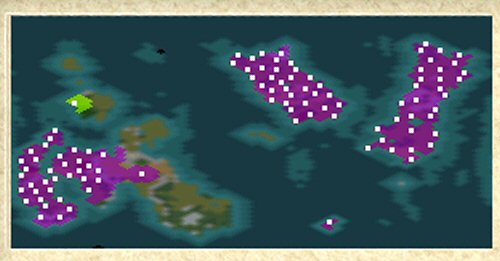zagnut
Monarch
A balanced approach always seems best to me. While it may not result in the highest score, it makes me happier to know that while my troops are away conquering other civs, the people back home are enjoying as many luxuries as possible.
I achieved a domination victory in 1355. I attacked Persia early before it could attack me. However, that was the only time during the game that I concentrated everything on producing military units. I saw it as necessary in order to survive against a more powerful opponent. As it turned out, Persia was not that powerful, but I am happy I did not underestimate them.
I then kept 2 cores producing as much research and production as possible. I didn't pay too much attention to the outlying cities or captured cities. Usually I just expanded their borders with a Temple and then used them to build units, workers or cannon/artillery.
I thought the really unique thing about this game was the lack of Iron and Horses while on a small continent against an aggresive foe with a strong unique unit. I think that changed the entire dynamic of the game in the Ancient Age. Persia also seemed to have a tech boost. However, I was surprised that they did not put up more of a fight when I attacked them. In retrospect, it may have been because they were devoting so much production to infrastructure and Wonders and not enough to units.
The other challenging thing was to devise the attacks against the other continents over a wide ocean. GOTM 27 was good training for that task.
I achieved a domination victory in 1355. I attacked Persia early before it could attack me. However, that was the only time during the game that I concentrated everything on producing military units. I saw it as necessary in order to survive against a more powerful opponent. As it turned out, Persia was not that powerful, but I am happy I did not underestimate them.
I then kept 2 cores producing as much research and production as possible. I didn't pay too much attention to the outlying cities or captured cities. Usually I just expanded their borders with a Temple and then used them to build units, workers or cannon/artillery.
I thought the really unique thing about this game was the lack of Iron and Horses while on a small continent against an aggresive foe with a strong unique unit. I think that changed the entire dynamic of the game in the Ancient Age. Persia also seemed to have a tech boost. However, I was surprised that they did not put up more of a fight when I attacked them. In retrospect, it may have been because they were devoting so much production to infrastructure and Wonders and not enough to units.
The other challenging thing was to devise the attacks against the other continents over a wide ocean. GOTM 27 was good training for that task.

 , but the sea really is a potent defence in Civ3, just because the AI are so hopeless at seaborne invasions. In this game, beating Xerxes served this purpose as well.
, but the sea really is a potent defence in Civ3, just because the AI are so hopeless at seaborne invasions. In this game, beating Xerxes served this purpose as well.![PTW Icon [ptw] [ptw]](/images/smilies/ptw.gif) 1.27f - OPEN
1.27f - OPEN


 Great Minds Think Alike ! ... or ...
Great Minds Think Alike ! ... or ...  Fools Seldom Differ !
Fools Seldom Differ !




 since a uni is 200 shields for 4cpt. Therefore whilst I had cathederals and libraries to build it was not a good idea to continue militarily since building banks and harbours in the core would help improve my ability to rush more than building units to continue an offensive. Also you need to rush settlers which is equivalent to a temple and 2 food.
since a uni is 200 shields for 4cpt. Therefore whilst I had cathederals and libraries to build it was not a good idea to continue militarily since building banks and harbours in the core would help improve my ability to rush more than building units to continue an offensive. Also you need to rush settlers which is equivalent to a temple and 2 food. Very clever Xerxes!
Very clever Xerxes!